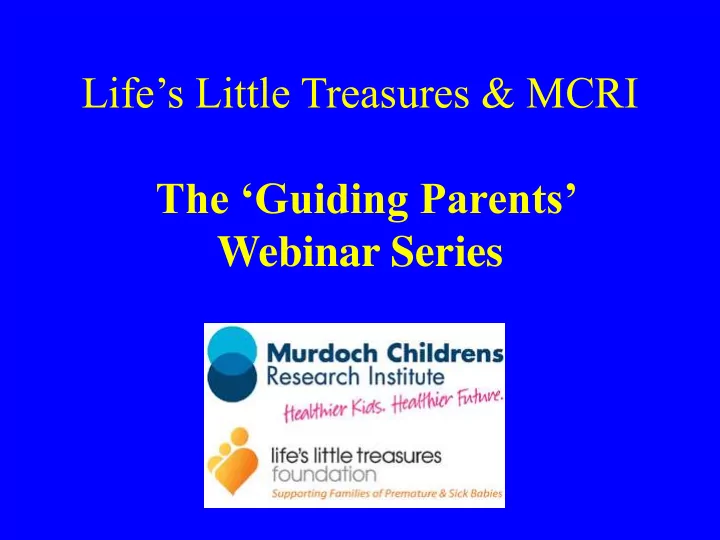

Life’s Little Treasures & MCRI The ‘Guiding Parents’ Webinar Series
Past Webinars • Early intervention for infants born preterm – Dr Alicia Spittle • Who’s Looking after Mum and Dad – Dr Carmen Pace http://www.lifeslittletreasures.org.au/2015/04/lifes-little- treasures-and-mcri-webinars-2014/
School Readiness in Preterm Children From NICU to NAPLAN…. Assoc. Prof. Gehan Roberts Centre for Community Child Health, RCH Murdoch Childrens Research Institute Department of Paediatrics, University of Melbourne
Poll 1: who’s in the audience?
Contents • Introduction – Why are preterm children at risk? • What do children need to succeed in school? • Management strategies • Audience questions • Summary and Discussion
Victoria: about 75 000 births/yr • Preterm <37/40 (~6 000) – Late preterm: 32 to 36+6 – (~ 7%) – Very preterm: 28 to 31+6 – Extremely preterm: <28 – (~1.5%) • Another 25% (~19 000) born at 37 and 38 weeks
Prevalence of special educational need by gestation MacKay DF, et al. Gestational Age at Delivery and Special Educational Need: Retrospective Cohort Study of 407,503 Schoolchildren. PLoS Med 2010.
Prevalence of special educational need by gestation MacKay DF, et al. Gestational Age at Delivery and Special Educational Need: Retrospective Cohort Study of 407,503 Schoolchildren. PLoS Med 2010.
Questions “ Is it more beneficial for children who were very premature at birth to be held back a year? ” “Is there a negative impact on children's confidence when they are held back, and their peers go on to school? If so, how can parents help them rebuild their confidence?”
Questions “Understanding that my son has developmental delays, what are the key factors for a premmie to be school ready?” “What things should be taken into consideration in deciding whether or not to send a child to school with delayed fine motor skills (ie in particular, unable to trace basic shapes or draw basic things)”
What do children need to succeed in school? • Three key attributes – Children who are ready to learn – Schools that are ready for children – Parents and communities who support the child’s development. “School Readiness” Copple, National Educational Goals Panel, 1997
What do children need to succeed in school? • Readiness to learn: 5 skill areas – 1) Health and physical development – 2) Emotional well-being and social competence – 3) Approaches to learning – 4) Communication skills – 5) Cognitive skills and general knowledge. Copple, National Educational Goals Panel, 1997
A suggested approach… • Early recognition of areas of vulnerability and areas of strength • Support the areas of vulnerability while moving ahead to the next developmental stage (rather than waiting for it to ‘catch up’)
Proportion of children with vulnerabilities in each domain School readiness %VPT %Control Odds Ratio Odds Ratio – Domain n=195 n=70 adjusted for social risk Health/ physical 35% 14% 3.3* 3.2* development Social emotional 21% 10% 2.3 2.3 skills Approaches to 53% 17% 5.5* 5.2* Learning Communication 20% 4% 5.6* 5.2* Cognition and 33% 7% 6.5* 5.9* General knowledge *P<0.05
Cumulative number of areas of difficulty 80 70 60 Proportion 50 VPT 40 Control 30 20 10 0 0 1 2 3 4 5 1 2 3 4 5 6 Number of Domains
‘Preterm and low birth weight babies’ by Dieter Wolke. The Sage Handbook of Developmental Disorders.
>1 Million Swedish children, born between 1987 - 2000, followed up between age 6 and 19 years
Questions “My child is now 15 months corrected. was only 8 weeks prem. Would he fall into this category of needing school readiness? He is reaching appropriate milestones thus far and shown no signs of being disadvantaged by his pre- term birth.”
Specific Management • Advocacy – Know your child – Become a powerful advocate for your child – Partner with your care team – Know the system
Specific Management • Preschool experiences – Developmental enrichment at home
Questions “How important is kindergarten for preterm babies and is starting early as possible best to ensure school readiness?”
Specific Management • Structured, high quality preschool
Specific Management • Transition program – School visits – Peer group – Meet the principal – Don’t be shy: ask for help!
Questions “My ex 26 week is almost 2 years old and receives speech and occupational therapy. What sort of things are in place to assist children with delays in the government, catholic & private system?”
Specific Management • Build a team around your child – Parents, Family and Friends – Kinder and School – GP, Maternal and Child Health Nurse – Paediatrician – Therapists: Speech, Psychology, OT, Physio…. – Assessments to inform Transition Plan • E.g. Speech or Cognitive testing
Questions “My ex 26 week is almost 2 years old and receives speech and occupational therapy. What sort of things are in place to assist children with delays in the government, catholic & private system?”
Questions “My school -age child has not accessed any service but I suspect there may be an issue. Who do I take my child to, to assess the child?”
Summary • Understand the preterm developmental profile • Work within local systems of care • Think broadly (be holistic) and longitudinally (key transitions) • Plan ahead in partnership
Recommend
More recommend